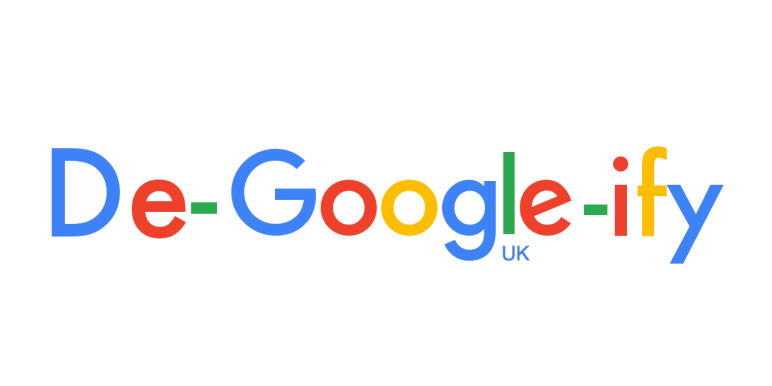Thank you to everyone who joined us at Birmingham Open Media last week for our meetup on how to De-Google-ify your life. It was fantastic to know so many people are concerned about our collective reliance on Google services and are interested in discovering viable alternatives.
Over the next week, we plan to share examples of high quality alternatives to everyday Google services. In the meantime, here’s an overview of why you should De-Google-ify in the first place.
Why de-Google-ify?
Google services are ubiquitous, free to use (we’ll come back to that) and, for the most part, extremely well-made. Given all of that, why on earth would you even consider switching to other services?
Commercial exploitation
The vast majority of Google’s revenues (87%, according to Wired) come from advertising. In order to maximise the profitability of the advertising it sells, Google collects a huge amount of personal information about you and how you use the internet. This includes all the searches you’ve ever made, the videos you’ve watched on YouTube, the places you’ve visited (thanks to mobile geo-location) and much, much more. The EU recently fined Google a record €2.4 billion for manipulating its search results to favour its own services and disadvantage competitors. What else might Google be doing with all the personal information it has access to? And even if you feel comfortable with how Google is operating now, there’s no way of knowing how the Google of tomorrow will operate.
Security
While Google is widely respected for its work on improving web security, there’s no getting round the fact that the corporation’s business model, which is predicated on collecting and exploiting personal information, creates a seriously tempting target for hackers. Why put all your eggs in one basket when other services are available, including services which deliberately seek to minimise the amount of personal information they collect, reducing the negative consequences should somebody manage to compromise their systems?
Government surveillance and censorship
Even if you’re intensely relaxed about Google’s commercial practices and the risk of being hacked, it’s worth considering how our use of Google services relates to the disproportionate surveillance and censorship the Open Rights Group campaigns against. Back in 2013, the whistleblower Edward Snowden famously revealed how the top-secret Prism programme (allegedly) gave the NSA direct access to the servers of Google, Facebook, Apple and other internet giants.
More recently, there has been a lot of political debate (for want of a better word) around the issue of violent extremism and what role internet giants such as Facebook and Google should play in tackling it online. Just this week, Amber Rudd, successor as Home Secretary to the famously strong and stable Theresa May, has travelled to Silicon Valley to demand that tech firms such as Google ‘do more’ to tackle online extremism or face having fresh legislation imposed on them.
Unsurprisingly, substance is hard to come by, but it looks likely Google and others will be expected to put in place additional measures to detect and quickly remove ‘extremist’ content. These developments pose real concerns for freedom of expression, giving private companies the power to censor speech and restrict access to information without going through due legal process. For more information, check out the Open Rights Group’s recent blog on automatic online censorship.
Google, by virtue of its size and influence, represents an attractive target for governments wishing to undermine their citizens’ fundamental rights. Reducing our dependence on Google services and supporting greater decentralisation of online services would make it harder for governments to pursue over-reaching surveillance and censorship programmes. Check out the talks from the Decentralized Web Summit, held in 2016.
Practical ways to De-Google-ify your life
In our next blog post, we’ll be sharing examples of high-quality, privacy-respecting alternatives to Google services you know and love/hate.
If you can’t wait that long, check out the excellent AlternativeTo website, which contains crowdsourced recommendations for alternatives to all kinds of software.

2 thoughts on “Why you should De-Google-ify your life”